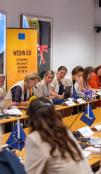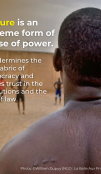No to vaccine nationalism, yes to vaccine multilateralism

After several difficult months trying to overcome the COVID-19 pandemic and 1,3 million dead around the world, we are finally beginning to see light at the end of the tunnel. On 9 November the German company BioNTech and its US partner Pfizer announced important progress in the development of a vaccine.
A vaccine project supported by the European Union
This particular project has been carried out with significant support from the European Fund for Strategic Investments and the EU Research Framework Programme Horizon 2020. So we Europeans can be especially proud of this success. The BioNtech vaccine uses an innovative approach based on the genetic code of the virus. Other potential vaccines are also entering the final stages of the testing and certification procedures.
“What we see is the success of the scientific community and the close collaboration between public universities and institutes as well as the private sector.”
These developments would not have been possible without the enormous efforts by scientists around the world who have worked flat out to develop a vaccine against a virus nobody knew less than a year ago. What we see is the success of the scientific community and the close collaboration between public universities and institutes as well as the private sector.
While the results of the clinical trials are still preliminary, they inspire hope that this and other vaccines will be available in the near future. This is unreservedly good news, but this hope will only materialise if we get the whole world vaccinated rapidly. No one is really safe until everybody is safe. And a restart of the global economy hinges on all countries having access to vaccines, regardless of their level of income.
“This hope will only materialise if we get the whole world vaccinated rapidly. No one is really safe until everybody is safe.”
We do not know yet which vaccines will ultimately make it over the finish line, in which order and when. Developing a vaccine is one thing, producing and distributing it is another. In the case of the BioNTech/Pfizer candidate for example, two shots will be needed to achieve immunisation. Multiplied by 8 billion people on the planet, this means at least 16 billion doses are required. No single company has such a production capacity.
In addition, this new type of vaccine must be kept at temperatures below -70˚C: this is well beyond the capabilities of a household fridge as you would usually find in the offices of General Practitioners. This is a challenge for the EU, but even more so for distributing such a vaccine to remote villages in Niger, Peru or Kiribati. Other potential vaccines may have different requirements.
“We need to build now the plans, resources and infrastructure for the deployment of vaccines worldwide. We cannot afford to wait and risk losing more time and lives.”
This is why we need to prepare in advance, to build now the necessary plans, resources and infrastructure for the rapid and safe deployment of vaccines in Europe and in our partner countries as soon as they become available. We cannot afford to wait until a vaccine is ready and risk losing more time and lives.
We must avoid “Vaccine nationalism”
However, we will only benefit from these ground-breaking achievements if we avoid ‘vaccine nationalism’, where countries unduly restrict access to vaccines. Indeed, the risk is that, as usual, the strongest and richest wrestle themselves to the front of the queue.
Another risk we run is ‘vaccine diplomacy’. Like the ‘mask diplomacy’ of early 2020, some countries may link access to much-needed medical treatments to political compliance or obedience. The EU stands for the exact opposite: vaccines should not be ‘bargaining chips’ or the preserve of the rich. They should be treated as global public goods and distributed without discrimination, based on medical needs.
“Since the very start of this pandemic, the European Union has chosen multilateralism and cooperation over nationalism and competition.”
Since the very start of this pandemic, the European Union has chosen multilateralism and cooperation over nationalism and competition. European Commission President Von der Leyen organised a global pledging event, which collected almost €16 billion for responding to combat the disease and the EU initiated the Resolution on COVID-19 adopted at the World Health Assembly last May.
EU and its Member States supports COVAX with €870 million
While entering into advance purchase agreements with different vaccine manufacturers to cater for Europe’s own needs, the EU has also pledged €400 million to support the COVAX facility, through which low- and middle income countries can get access to COVID-19 vaccines. At the virtual Paris Peace Forum, President Ursula von der Leyen, announced this week that we will add €100 million in support to COVAX.
Several EU Member States are contributing as well, highlighting another example of the power of Team Europe: EU and its Member States are mobilising together €870 million for COVAX. As my colleague Jutta Urpilainen, Commissioner for International Partnerships, said: “The EU is demonstrating we are serious about our commitments to leave no one behind and make the COVID-19 vaccine a global public good”.
COVAX needs still additional support
COVAX has been set up by the World Health Organization (WHO), the Global Alliance for Vaccines and Immunisation (GAVI) and the Coalition for Epidemic Preparedness Innovations (CEPI). It aims to provide two billion doses of vaccine to the most vulnerable people and to health-care workers. To date, 186 countries have already signed up for COVAX. As my colleague Stella Kyriakides, Commissioner for Health and Food Safety, said this week: “More support will be required next year to produce and distribute a safe and efficacious vaccine across the world as soon as it becomes available”. So I call on more countries to join the EU in supporting COVAX in its vital mission.
We need to team up with partners around the world
It is essential that we team up with partners around the world, including business and civil society organizations, to arrange the global roll-out of COVID-19 vaccines and ensure the reliability of global supply chains. .
Each country and region has particular strengths. Some, like India have a lot of experience in vaccine production or distribution under difficult climatic conditions. We also have to work closely with Africa to tap their experience in handling infectious diseases on the ground, supporting its public health institutions and partnering with their nascent vaccine industry.
The European External Action Service with its delegations and the European Commission are already forging these partnerships. We plan to discuss this issue in the coming weeks with the ASEAN countries and India. It will be also an important part of our discussion on December 9 with African Union leaders.
We need to improve our preparedness to pandemics
Finally, we should use the crisis to improve our preparedness to pandemics at the global level. Scientists have warned for years that the destruction of habitats increases the likelihood of zoonotic transfers, in turn leading to pandemics. We need to prevent this destruction but also to develop protocols to better detect emerging diseases. We also need to understand why some in our populations are sceptical and hesitant about vaccines and develop strategies to make sure they are seen as safe and reliable.
“We should in particular equip the WHO to manage the health challenges of the 21st century. We will discuss this urgently with the new US administration and our other G20 partners.”
For all these reasons, we need to keep working in a collaborative and multilateral manner, bringing researchers, companies and countries all together. We should in particular equip the WHO with the tools to manage the health challenges of the 21st century. All this and more we will discuss urgently with the new US administration and our other G20 partners.
The EU for its part will continue to support the global effort for vaccine research and the mass production and distribution of safe COVID-19 vaccines. Leaving no one behind.





